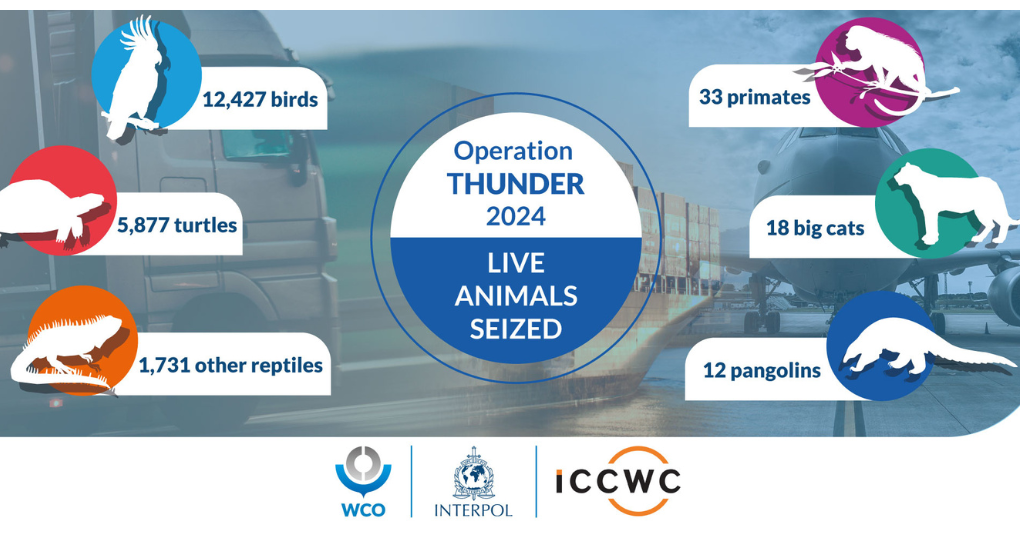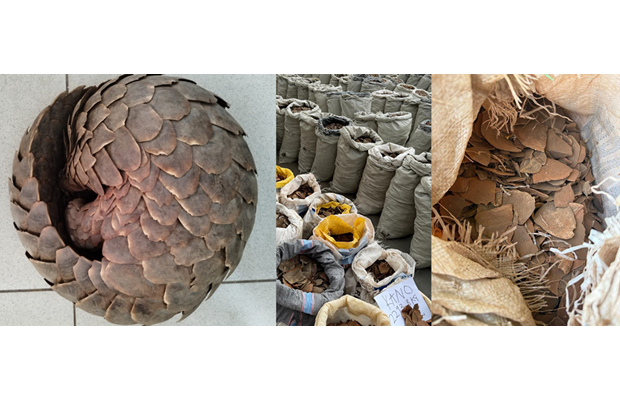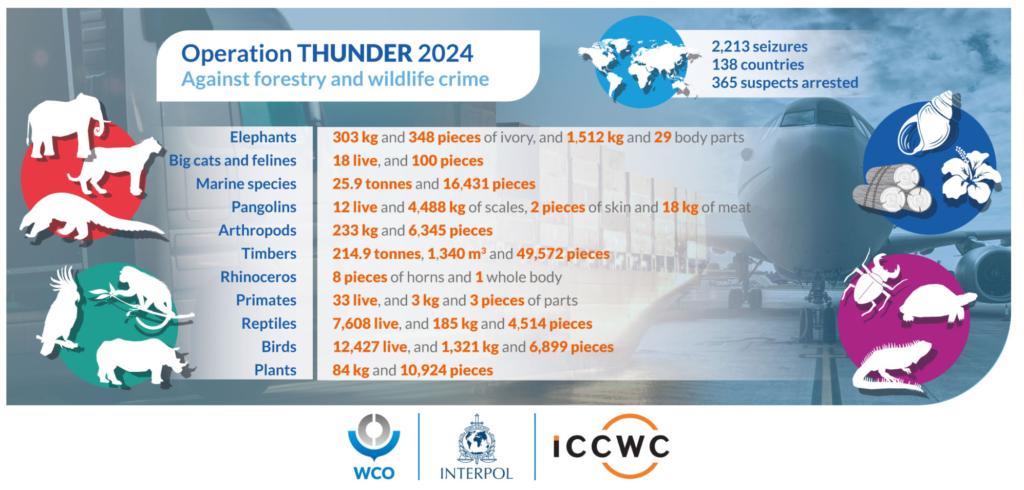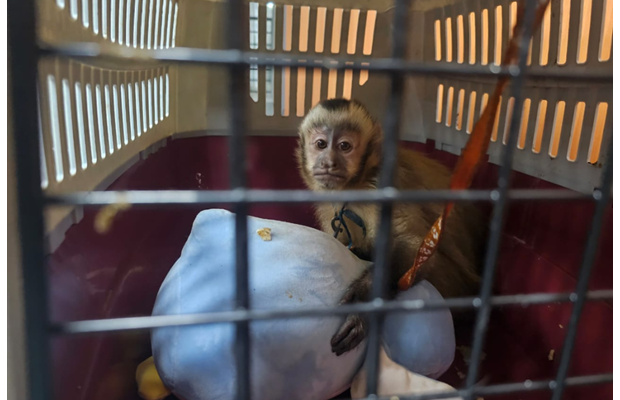Tulani Ngwenya
GENEVA, Switzerland — A global wildlife and forestry trafficking crackdown has yielded immense results after nearly 20 000 live animals – all endangered or protected species – were seized during a global operation jointly coordinated by INTERPOL and the World Customs Organisation (WCO).
Operation Thunder 2024, which ran from 11 November to 6 December 2024, marked the largest and most extensive initiative since the series began in 2017.
Authorities from 138 countries and regions, including police, customs, border control, forestry, and wildlife officials, collaborated in the operation, resulting in 365 arrests and the identification of six transnational criminal networks.

These networks were implicated in trafficking animals and plants protected by the Convention on International Trade in Endangered Species of Wild Fauna and Flora (CITES). The trafficked species were destined for markets where they are coveted for food, traditional medicine, luxury items, or as exotic pets.
Among the 2 213 global seizures were live animals such as big cats, birds, pangolins, primates, and reptiles. Wildlife forensic experts collected DNA samples from the seized animals to aid in future prosecutions, confirming species identification and tracing trafficking routes. The animals were transferred to conservation centres for health assessments and, where possible, repatriation or rehabilitation according to national regulations.
Massive seizures of animal parts, plants, and timber

In addition to live wildlife, the operation resulted in the seizure of hundreds of thousands of protected animal parts and derivatives, trees, plants, marine life, and arthropods. Timber trafficking dominated the seizures, primarily uncovered in sea cargo shipments, while airports and mail hubs were hotspots for other smuggling activities.
Authorities also targeted online platforms, uncovering suspects using multiple profiles and linked accounts across social media and marketplaces to facilitate illegal trade. More than 100 companies involved in trafficking protected species were identified.

Significant seizures around the globe:
- Indonesia: 134 tonnes of timber destined for Asia via ocean freight.
- Kenya: 41 tonnes of exotic timber headed to Asia.
- Nigeria: 4,472 kg of pangolin scales.
- Türkiye: 6,500 live songbirds were found during a vehicle inspection at the Syrian border.
- India: 5,193 live red-eared ornamental slider turtles concealed in passenger suitcases from Malaysia.
- Peru: 3,700 protected plants intercepted en route from Ecuador.
- Qatar: Eight rhino horns discovered in a suspect’s luggage transiting from Mozambique to Thailand.
- United States: One tonne of sea cucumbers smuggled from Nicaragua.
- Hong Kong, China: 973 kg of dried shark fins from Morocco.
- Czech Republic: Eight tigers, aged between two months and two years, were found in a suspected illegal breeding facility.
- Australia and the UK: seizures of bear bile used in traditional medicine.
- More than 300 firearms, vehicles, and poaching equipment were seized.
Global cooperation key to combating wildlife crime

Valdecy Urquiza, INTERPOL Secretary General, highlighted the broader consequences of wildlife crime: “Organised crime networks are profiting from the demand for rare plants and animals, exploiting nature to fuel human greed”.
“This drives biodiversity loss, destroys communities, contributes to climate change, and fuels conflict and instability. INTERPOL remains committed to protecting our planet for future generations.”
Ian Saunders, WCO Secretary General, highlighted the growing scale of the issue: “Operation Thunder continues to shed light on a crime that is often not a priority for enforcement actors”.
“Through our joint efforts, we have refined our enforcement strategies, but the illegal wildlife trade remains highly lucrative and devastating.”
Ivonne Higuero, CITES Secretary-General, lauded the collaborative efforts.
“Operation Thunder exemplifies the power of international collaboration in the fight against wildlife crime. The increasing participation of national authorities reflects the urgency and scale of this global challenge.”
More from Africa News 24
IMO, WWF sink teeth into wildlife trafficking with global training effort
Building a global intelligence network
Operation Thunder has played a pivotal role in developing a comprehensive global intelligence picture of wildlife and timber trafficking. By sharing actionable intelligence and updating critical information on INTERPOL Red Notices, countries enhanced their ability to resolve cross-border cases and dismantle transnational criminal networks.
The operation was supported by the European Union, the UK Department for Environment, Food and Rural Affairs (DEFRA), and the United States Agency for International Development (USAID), under the partnership framework of the International Consortium on Combating Wildlife Crime (ICCWC).












